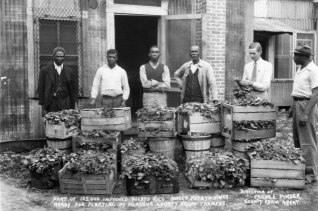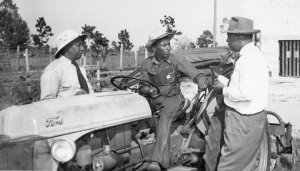|
The Archives and Manuscripts Section includes the University of Florida Archives as well as general literary and historical manuscripts. The emphasis of the latter is on Florida related materials. Archival records related to African American history can be found in a number of collections, but only three topics have been highlighted for this exhibit. The 1963 civil rights struggle in St. Augustine is chronicled in the special investigation files of Governor Farris Bryant. African American rural life is documented through the annual reports of agricultural extension agents taken from the University Archives. Finally, the 1969 protests against the closing of Gainesville's Lincoln High School are represented by images taken by a University of Florida photographer.
St. Augustine Civil Rights Struggle
In 1963 and 1964, Saint Augustine was the scene of a major civil rights campaign to end racial segregation and violence against African Americans in that city. The activities of civil rights organizations and the violent response of the Ku Klux Klan were closely monitored by the office of Governor Farris Bryant.
Photograph taken by an investigator from the governor's office of a sit-in at the Monson Motor Inn in St. Augustine. The Southern Christian Leadership Conference led by Reverend Martin Luther King, Jr., organized the sit-in. King and hundreds of others were arrested during the 1964 demonstrations. [From the Farris Bryant Papers, Investigation Files, Saint Augustine Civil Rights Movement, 1961-1964.]
 Poster distributed by the Southern Christian Leadership Conference asking tourists to boycott Saint Augustine. [From the Farris Byrant Papers, Investigation Files, Saint Augustine Civil Rights Movement, 1961-1964.] Poster distributed by the Southern Christian Leadership Conference asking tourists to boycott Saint Augustine. [From the Farris Byrant Papers, Investigation Files, Saint Augustine Civil Rights Movement, 1961-1964.]
Student Protest in Gainesville
In 1969, Alachua County was under court order to integrate its public school system. As part of plans to integrate, the school board announced it would close Lincoln High School, a predominantly black school, and relocate its students. This decision angered black residents who had strong emotional ties to Lincoln, and who thought it should remain open as an integrated school. On November 25, 1969, some 2,000 students boycotted their classes and marched down University Avenue to a rally outside the offices of the Alachua County School Board. However, protests did not save Lincoln, which closed as a high school the following year.
[From the Florida Photograph Collection] Rural African American Life
Throughout most of the state's history, Florida's African American population resided in rural, not urban, areas. In several panhandle and northern counties, African Americans were the majority, not the minority, and farming was the chief economic activity. [From the Florida Photograph Collection]
The Florida Cooperative Extension Service was created in 1915 to provide advice and technical assistance to Florida's farmers. A network of farm and home extension agents was administered by the University of Florida and worked closely with researchers at the Florida Agricultural Experiment Station. In the era of Jim Crow, a separate network for black farmers was established under the direction of a state agent at Florida A & M University. Reports from the Negro State Agent and individual African American county agents were sent to Gainesville and now form part of the University Archives.
Letter from Alachua County Agent Frank Pinder, 12 July 1934, to A. P. Spencer, head of Florida's agricultural extension program, reflecting on Pinder's work with farmers in the county. [From Series 91b, University of Florida Archives, Florida Cooperative Extension Service, Annual Reports.]
 Photograph of County Agent Frank Pinder (far right) with local farmers receiving sweet potato vines for planting taken in 1940. [From the E. H. Bone Collection, University of Florida Archives.] Photograph of County Agent Frank Pinder (far right) with local farmers receiving sweet potato vines for planting taken in 1940. [From the E. H. Bone Collection, University of Florida Archives.]
 Program for the Farmers and Homemakers Harvest Program, October 11, 1946, Lake City, organized by Columbia County Agent McKinley Jeffers and Home Demonstration Agent Ozella Sansome. [From Series 91b, University of Florida Archives, Florida Cooper-ative Extension Service, Annual Reports.] Program for the Farmers and Homemakers Harvest Program, October 11, 1946, Lake City, organized by Columbia County Agent McKinley Jeffers and Home Demonstration Agent Ozella Sansome. [From Series 91b, University of Florida Archives, Florida Cooper-ative Extension Service, Annual Reports.]
 Photograph of County Agent McKinley Jeffers (bottom, right) with farmer Tally Watson and his family in Fort White taken in 1955. [From the University of Florida Archives Photograph Collection.] Photograph of County Agent McKinley Jeffers (bottom, right) with farmer Tally Watson and his family in Fort White taken in 1955. [From the University of Florida Archives Photograph Collection.]
Photograph of Duval County 4-H members preparing for a trip to the annual state Short Course Meeting in Tallahassee. [From Series 91b, University of Florida Archives, Florida Cooperative Extension Service, Annual Reports.]
Display of agricultural products of the Florida Farmers' Cooperative Association at the 1939 Florida State Fair in Tampa. The Association marketed the agricultural produce of African American farmers but achieved success only after dropping the word Negro from its name. [From Series 91b, University of Florida Archives, Florida Cooperative Extension Service, Annual Reports.]
|